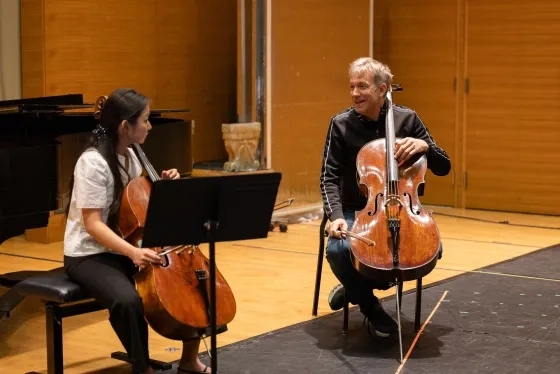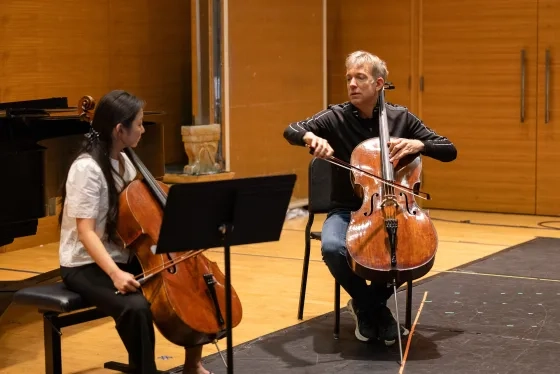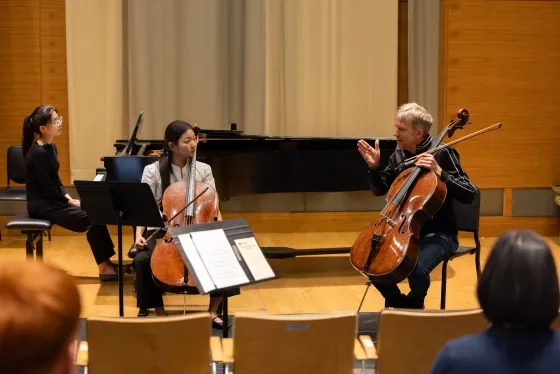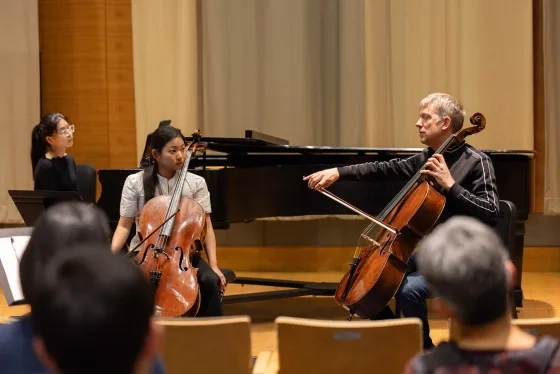Cellist Johannes Moser on Masterclasses, Music, and Social Media
Moser gave a masterclass for SFCM students between rehearsals at the San Francisco Symphony, where he was in town to premiere a new work.
Cellist Johannes Moser returned to SFCM in May to give masterclasses between his time at the San Francisco Symphony (SFS)—and his hikes in the Bay Area.
Moser, who gave a virtual masterclass at SFCM in April of 2020, thanked the city, the Conservatory and the SFS for a “phenomenal 10 days” in an Instagram post alongside pictures from a hike in Samuel P. Taylor State Park in Lagunitas. Below, read a Q&A with Moser ahead of his time in San Francisco.
SFCM: How long have you been giving masterclasses?
Moser: Pretty much all my career, though I feel sort of sorry for the people that got masterclasses from me early on, because I didn't know what I was doing [laughs]. Obviously, giving a masterclass is so different from guiding students over a couple of years, and understanding that took me some time to realize and to not give the sort of lessons I would to a permanent student.
Masterclasses work both ways for me in the sense that if you really have a student that is wanting to actively participate and make this a great experience for everybody else, it's a lot of fun. It's important that when you give a masterclass that everybody leaves with something tangible: “This what I can take away from these 30 or 45 minutes with Johannes.” Another thing I find very important with masterclasses is that there's people watching, so you do want to make it entertaining and let everybody take something from it that's sort of universal, not just tailored to the one person.
What do you find challenging about teaching in a masterclass setting?
The biggest challenge for me is to—within those five or 10 minutes that students play at the beginning—to decide which 99 things not to say in favor of one thing that really will hit home for them and the audience. Since I've been teaching now for a while, certain algorithms and certain mechanisms just are in place where I could give a standard class, with certain problem-solving strategies repeating themselves. However, if you want to be really giving a tailored experience for that person, you need to break away from that. And you need to think, ‘Well, what will make that moment special?’ And usually it's through the method of elimination of not saying all the other things.
What is that process like—how do you sort of ‘triage’ what you want to work on with a student?
It's finding that right mix of being specific about the piece that they've brought and general comments on things that might stand in their way of going to the next level.
I've no delusions of grandeur that suddenly I bring something to the table that they've never heard of [laughs]. But I think it's good for some students to hear the same thing from a different person, which maybe gives it a different twist or just a different angle. I also have to be a little bit mindful, for example, when someone comes with a certain set of bowings, so that I don’t crash that. Just because it's not my way, why should it be wrong? I think in a way every teacher has pride in what they teach, so you want to be careful with that as well.
However, I do think that some artistic sensibilities between the both sides of the Atlantic are so different that it's also good to hear a different perspective. And that goes especially when you come, for example, to Johann Sebastian Bach, where maybe the Eurocentric approach is a little bit more on the “fundamental Baroque performance practice” side of things. You have to understand a student within the context of the socialization of their music: If I came with a completely Baroque approach to a student, and told them not to use any vibrato, it would be like cutting a limb off [laughs].
You have almost 50,000 followers on Instagram—what is your approach to social media?
In the beginning, like for everybody, it was just very playful. I was born at the end of the ‘70s, so at my friend's house I saw an Apple Macintosh, and I had my first mobile phone at 21. So when I started using Instagram and Facebook, those were kind of new inventions, and nobody quite knew what to do with those tools.
But now I feel that the use of social media, for me, crystallized by using those tools to translate into the real world. More and more activity happening on social media also stays on social media, and that's fine. But that’s not really where I see the value of that medium, because I am still very much a fan of the physical world. If my social media can work as an augmentation or an enhancement of the understanding of what we do as musicians, then I feel that can actually spark curiosity. You know, I personally find it puzzling that there's such a strict ban on social media use in concerts and rehearsals, for example. On the one hand, it's nice that you don't have to stare at someone’s screen in front of you, but I wish some organizations would allow, for example, one or two influencers to come to the performances and do some Instagram Reels about the performance and about their experience. I feel like that would really go a long way, but we're not there yet.
And you have to focus on the ones that work for you. I tried TikTok; it didn't gain any traction. I think it's also a question of demographics, but you have to be so quick on TikTok, and it often involves some silly dance, which is not my forte.
What advice would you give to students who look at your career as a model?
The musician of the 20th century, the model that I grew up on, was practice, practice, practice, practice, do a competition, do some auditions and then, you know, everything's going to be fine. Those days are gone. So I think that any musician of the 21st century needs to come to terms with the fact that their work is not only artistic anymore, it’s also having to be an advocate for the art form. A musician now has to sort of have a 360-degree approach to not only performing at the best level, but also be a great advocate, maybe through social media or through doing outreach.I think we need to branch out and we need to just become more well-rounded professionals.
And you know, have a balanced life: See as many friends as you can, read as much as you can, see as many movies as you can. Don't close yourself off to any experience. Enjoy any sort of artistic endeavor—whatever it may be—as much as you can in order to build a sort of a library for your soul to become a well-rounded person as well as an artist.
Learn more about studying cello at SFCM.



